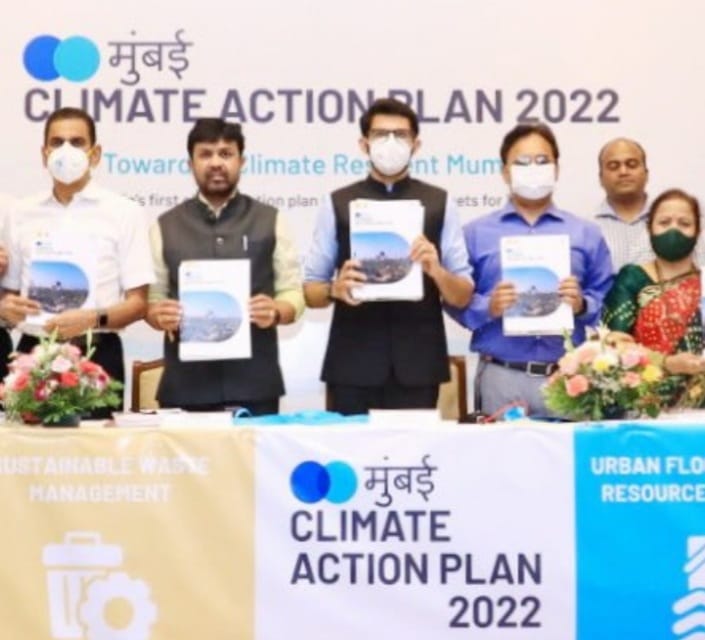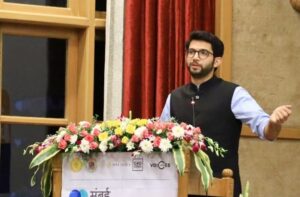Brihanmumbai Municipal Corporation releases Mumbai’s first-ever Climate Action Plan

As the recently published Intergovernmental Panel on Climate Change (IPCC) Working Group Il report warns of severe damages from sea-level rise, critically high temperatures and increased risks from climate impacts for coastal cities like Mumbai, the Brihanmumbai Municipal Corporation (BMC) is committed to building a climate-resilient city.
|| Elsie Gabriel
After a vulnerability assessment, greenhouse gas (GHG) and natural green cover inventory over the last six months, the BMC with technical support from the World Resources Institute (WRI) India and the C40 Cities network, on Sunday inaugurated Mumbai’s first Climate Action Plan (MCAP), a policy document to adopt an evidence-based planning approach and mobilize resources to move from action planning to strategic projects.
Uddhav Thackeray, Chief Minister of Maharashtra, said, “While India is in pace to meet its Nationally Determined Contributions, Maharashtra is committed to leading India’s battle against the impending climate crisis through policy-governance changes and instilling the culture of climate action. The MCAP is designed to fulfil the Paris Agreement’s aim of reducing global warming to 1.5 degrees Celsius. Mumbai will become a climate-resilient metropolis as a result of the evidence-based policies that led to the creation of MCAP.”
Through the plan, the BMC also has its eyes set on Mumbai achieving net-zero ahead of the Government of India’s deadline of 2070. Achieving a balance between the quantity of greenhouse gas emissions generated and the amount removed from the atmosphere is referred to as net-zero.
This holds significance in light of announcements made by Prime Minister Narendra Modi during the
Conference of Parties (COP26) at Glasgow setting a 2070 Net Zero goal for the country.

“Various recent extreme weather disasters in Maharashtra, such as Cyclone Tauktae, urban floods, and untimely rains, have demonstrated the importance of implementing localised mitigation and resilience techniques. Our goal is to urge people to take action on climate change at the local level. In a city like Mumbai, achieving climate resilience requires striking the ideal balance between development aspirations and environmental preservation,” said Aaditya Thackeray, Cabinet Minister of Environment & Climate Change, Government of Maharashtra.
The pathways scenario exercise under MCAP helps establish an evidence base on which the city can set emissions reduction targets for energy, transport, and waste sectors, which are the major contributors to GHG emissions in the city. While the energy sector accounts for 72% of total emissions, the transport and waste sector are responsible for 20% and 8 % respectively.
MCAP has an overall mitigation goal of attaining net-zero emissions by 2050. The plan’s interim and long-term objectives include a 30% decrease in emissions by 2030, a 44% reduction by 2040, and a net-zera reduction by 2050 compared to base year emissions (2019). For 2019, the base emissions were calculated to be 23.42 million tonnes of carbon dioxide emissions (CO2e), or 1.8 tonnes CO2e per person.
MCAP focuses on six sectors in order to provide sector-specific mitigation and adaptation strategies. The MCAP puts emphasis on decarbonizing Mumbai’s energy grid and building energy-efficient and climate-resilient infrastructure under the building energy efficiency theme and promoting low carbon mobility solutions under the sustainable mobility theme, with a strong focus on non-motorized transport infrastructure and zero-emission fuels.
“To guarantee continuity and consistency across outcome indicators and objectives, the six sectoral action plans align with important national programmes and policies such as the National Clean-Air Action Planning (NCAP) standards, the Swachh Bharat Mission targets, and the Climate Smart Cities guidelines,” said IS Chahal, Municipal Commissioner of Mumbai. “MCAP aims to guide the city towards a net-zero future through inclusive, low carbon urban development,” he said.
MCAP aims to implement a zero-landfill waste management plan under sustainable waste management. Similarly, the urban greening and biodiversity theme will focus on increasing resilience by reducing water-sanitation inequity and adopting nature-based solutions for water conservation and flood risk management, while the urban flooding and water resource management theme will focus on increasing resilience by reducing heat risk and increasing the city’s resilience to flooding events. MCAP envisions reducing air pollution by improving monitoring, enacting effective regulations, and switching to cleaner technologies.
“BMC has increased its attention on combating climate change and boosting Mumbai’s climate resilience in the face of rising global temperatures and more frequent extreme weather events in recent decades. The chosen six focus areas of Mumbai CAP are congruent with India’s commitments towards the Sustainable Development Goals (SDG), such as SDG 11 (Sustainable Cities and Communities) and SDG 13 (Climate Action) amongst others,” said Sanjeev Kumar, Additional Municipal Commissioner (City), BMC.
The plan’s major goal is to develop a comprehensive strategy to address climate change concerns in Mumbai by implementing inclusive and strong mitigation and adaptation strategies.
C40 evaluated Mumbai’s ‘Climate Action Plan 2022’ and accompanying documents to its Climate Action Planning Framework and found them to meet their requirement. “The document demonstrates that Mumbai has thoroughly studied the sources of its greenhouse gas emissions, the effects of climate change on different sectors, communities and areas, the opportunities for climate change mitigation and adaptation, as well as robust steps towards monitoring implementation,” said Shruti Narayan, Regional Director (South and West Asia), C40 Cities.
As part of the C40 Cities Network, which Mumbai joined in December 2020, the city has successfully outlined its Climate Action Plan and is doing so in compliance with C40 guidelines and global standards.





